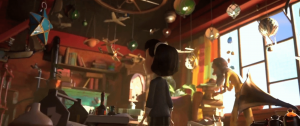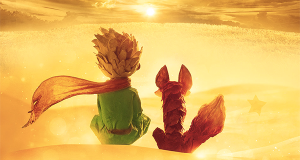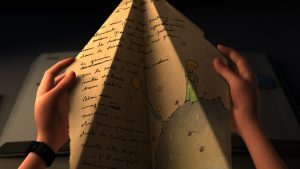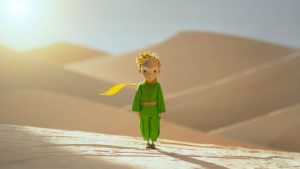This review contains spoilers for the 1943 book, but no major spoilers for the 2015 film. (You should watch it anyway)
• • •
Back in March, we published an article about a book beloved by millions, while we waited eagerly for the film adaptation’s release. Over four months later, it’s finally out; you can watch The Little Prince on Netflix right now, and you really should. You should watch it now, before you read this article. Don’t worry, it’ll still be here.
The film is visually captivating, with a whimsical score and an intimate framing story about an overscheduled girl moving to a new house, and her friendship with a neighbor who teaches her to see what is essential…even when what is essential is invisible.
Essential #1: Beauty
 The girl lives in a square, gray world. Her house is square and gray. Her neighborhood is square and gray. Her school is square and gray. Even her bushes are square, and a particularly gray shade of green. Her well-meaning mom keeps her life square and gray, too; square in the form of the literally-square pinboard that contains her mom’s plan for the girl’s life, and gray with the dreariness of a precisely-planned summer that the girl starts out following to the letter…before she is introduced to the Aviator.
The girl lives in a square, gray world. Her house is square and gray. Her neighborhood is square and gray. Her school is square and gray. Even her bushes are square, and a particularly gray shade of green. Her well-meaning mom keeps her life square and gray, too; square in the form of the literally-square pinboard that contains her mom’s plan for the girl’s life, and gray with the dreariness of a precisely-planned summer that the girl starts out following to the letter…before she is introduced to the Aviator.
 The Aviator, by contrast, lives in a gloriously lush and colorful world. A world of angles that aren’t 90°, of curves and light and color. It’s whimsical, unique, and beautiful, and the girl is as terrified as she is intrigued. But as she ventures deeper into the Aviator’s world, she sees a beautifully “non-essential” world that captivates and changes her. Her nature changes, the beauty of this new world gets into her, and she starts to be more than just a square, gray girl. It changes her forever. It becomes essential because it becomes a part of her.
The Aviator, by contrast, lives in a gloriously lush and colorful world. A world of angles that aren’t 90°, of curves and light and color. It’s whimsical, unique, and beautiful, and the girl is as terrified as she is intrigued. But as she ventures deeper into the Aviator’s world, she sees a beautifully “non-essential” world that captivates and changes her. Her nature changes, the beauty of this new world gets into her, and she starts to be more than just a square, gray girl. It changes her forever. It becomes essential because it becomes a part of her.
The Beauty of our world may not be as strikingly different at first glance, but it is still essential. “He has made everything beautiful in its time. Also, he has put eternity into man’s heart, yet so that he cannot find out what God has done from the beginning to the end.” (Ecclesiastes 3:11, ESV)
[pullquote]Beauty is essential. It is who we are, who God made us to be.[/pullquote] The world we live in demands that we fit its rigid, dull box of essentialism. But God says that the essence that lasts for eternity is a beauty and a mystery that He places in our hearts; God is beautiful, and He makes us beautiful, too. It’s a lush, living, whimsical beauty, which in its mystery remains invisible until we see it rightly.
So beauty is essential. It is who we are, who God made us to be.
Essential #2: Magic
The Little Prince toys with the word “essential.” The word shows up first on the posters at Werth Academie, and of course on the Business man’s awful planet, where everyone is “very busy with matters of consequence.”
 But then the word shows up unexpectedly, brought along with the flighty, wispy, trained fox. “What is essential,” he says, “is invisible to the eye.” And he clearly doesn’t mean the same thing that the Business man does. He’s referring to the love he and the Prince have for one another; the miracle of their taming, and the joy that they have in one another. The essential things are not the same “matters of consequence” that send the girl’s mother to work every day, but wonder and awe and joy and delight…in short, magic.
But then the word shows up unexpectedly, brought along with the flighty, wispy, trained fox. “What is essential,” he says, “is invisible to the eye.” And he clearly doesn’t mean the same thing that the Business man does. He’s referring to the love he and the Prince have for one another; the miracle of their taming, and the joy that they have in one another. The essential things are not the same “matters of consequence” that send the girl’s mother to work every day, but wonder and awe and joy and delight…in short, magic.
The Business man and his lackeys would never agree that magic is essential. At the climax of the film, they mock the Prince’s change of heart, laughing at the miracle that has come over him. They struggle to maintain their dreary control over the stars even as they’re slipping away. And when it’s gone, the businessman is still blind.
 But the other people on the planet, the captives in bondage to matters of consequence – they witness the miracle of the stars, and their hearts can’t help leaping for joy. You can see it in their faces; they don’t know why, they are simply driven to watch in wonder as this magic plays out before their eyes. Our hearts are made to respond to that; to sing at the beauty of the magic around us, to enjoy and participate in it. The Psalms give us great examples of rejoicing in the magic that God makes in our world.
But the other people on the planet, the captives in bondage to matters of consequence – they witness the miracle of the stars, and their hearts can’t help leaping for joy. You can see it in their faces; they don’t know why, they are simply driven to watch in wonder as this magic plays out before their eyes. Our hearts are made to respond to that; to sing at the beauty of the magic around us, to enjoy and participate in it. The Psalms give us great examples of rejoicing in the magic that God makes in our world.
[pullquote class=”left”]This “magic” is essential. It’s what God does, in the world and in our hearts, and the work that He invites us to join Him in.[/pullquote] Of course, as usual, what is essential is invisible to the eye – so they don’t see the great magic that has is changing the hearts of those in the plane, reminding them of who they are. It’s a beautiful, joyful, whimsical magic – one which gives us identity and purpose, and invites us in to be a part of it.
And so this “magic” is essential. It’s what God does, in the world and in our hearts, and the work that He invites us to join Him in.
Essential #3: Uniqueness
 Our world has a weird relationship with conformity. On one hand, we despise conformity and rejoice in uniqueness; movies like this obviously intend to make conformity look unattractive and dull. But on the other hand, the world around us demands that we fall in line with what it expects; that we wear the same clothes and live in the same place and enjoy the same things as everyone else. It’s an odd irony.
Our world has a weird relationship with conformity. On one hand, we despise conformity and rejoice in uniqueness; movies like this obviously intend to make conformity look unattractive and dull. But on the other hand, the world around us demands that we fall in line with what it expects; that we wear the same clothes and live in the same place and enjoy the same things as everyone else. It’s an odd irony.
In The Little Prince, we see conformity epitomized. From the commuters in the little girl’s neighborhood to the workers on the Business man’s planet, all the adults seem to look, act, dress, drive, live, and even move in the same way.
They contrast wildly with the fox, even down to their color and shape. He is unique, free, wispy and orange, unconcerned with the minutiae of the world around him. They are all the same, constrained, square and gray, and focused solely on their tasks. So why is the fox so different?
Because he’s tamed.
The fox himself explains this to the Prince. “To me,” he says, “you are nothing more than a little boy, who is just like a hundred thousand other little boys, and I have no need of you. And you have no need of me; to you, I am nothing more than a fox like a hundred thousand foxes. But if you tame me, then we shall need each other. To me, you will be unique in all the world; and to you, I shall be unique in all the world.”
 When we’re wild, we’re just like millions. But when we’re tamed, we’re unique in all the world. This is true and beautiful, but it isn’t something the world wants us to hear. “Don’t give up your freedom,” it insists. “Be essential, not tamed.” And we buy in, not realizing that the uniqueness is what is truly essential.
When we’re wild, we’re just like millions. But when we’re tamed, we’re unique in all the world. This is true and beautiful, but it isn’t something the world wants us to hear. “Don’t give up your freedom,” it insists. “Be essential, not tamed.” And we buy in, not realizing that the uniqueness is what is truly essential.
And the great irony is that taming is freedom! As the girl is tamed in the film, she shows that when we are tamed by a loving Tamer, He makes us free to have joy, and exult in that freedom; to have beauty, and inhabit that beauty as our own; to marvel at magic, and become a part of it.
[pullquote]Uniqueness is essential. It is whose we become, and its power to transform that God uses to tame us and make us unique in His joy.[/pullquote] The book adds a layer to this that we don’t see in the film. There, taming is a slow, long, intimate, irreversible process. But we see this in John 10, where our Tamer describes his love and caring for us—and His willingness to give up His life for us, for our freedom.
We are born wild and faceless, but our loving Father seeks to know us, tame us, and bring us into His beauty, all the while showing us a magical world of joy that we could never imagine.
So yes, uniqueness is essential. It is whose we become, and its power to transform that God uses to tame us and make us unique in His joy.
The Inivisible Essentials
 Of course, none of this is a surprise to the Little Prince. His childlike faith makes the essentials of beauty, magic, and uniqueness very clear. It is only to adults that this is a difficult concept. As the book says, it is “troublesome” that children always have to explain these things to adults.
Of course, none of this is a surprise to the Little Prince. His childlike faith makes the essentials of beauty, magic, and uniqueness very clear. It is only to adults that this is a difficult concept. As the book says, it is “troublesome” that children always have to explain these things to adults.
Still, the problem with being an adult is not age. “Growing up isn’t the problem. Forgetting is the problem.” It’s so easy to forget the essentials when they’re invisible. The beauty that defines who we are, the magic that we’ve been invited to do, the uniqueness that tames and frees us…none of these are visible from the surface. But “what is essential is invisible to the eye,” both to foxes and to us.
• • •
Thank you for reading Redeeming Culture. This article was outlined with help from my wife, Natalie Atwell, whose support with this site is always invaluable and whose taming I do not take for granted.

